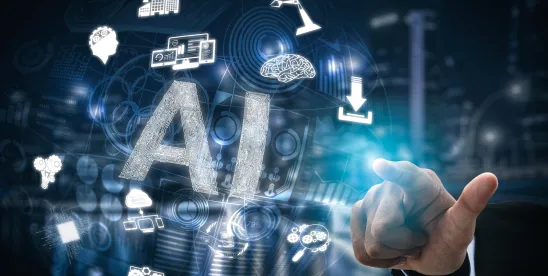- In early June, the Federal Trade Commission (FTC) and the Department of Justice (DOJ) reached an agreement dividing responsibility over AI oversight. The FTC will oversee competitive concerns relating to major software companies, while the DOJ will investigate the conduct of a large chip manufacturer.
- In a recent interview, the DOJ’s Jonathan Kanter warned that competition authorities must act “with urgency” to prevent undue consolidation in the AI space.
- Kanter stated that the FTC and DOJ are particularly interested in assessing the potentially anti-competitive results of “acqui-hire” arrangements whereby more established technology firms partner with smaller firms specializing in emerging technologies, such as AI, to jointly produce products and services.
Amid concerns about concentration in the nascent AI industry, Jonathan Kanter asserted in a recent interview that the Department of Justice (DOJ) will scrutinize the AI sector “with urgency.” Kanter, the Assistant Attorney General for the Antitrust Division, asserted that the DOJ is examining “monopoly choke points and the competitive landscape” of AI. According to Kanter, regulators are concerned that the AI industry is currently “at the high-water mark of competition, not the floor.” Therefore, Kanter believes that the DOJ must act to ensure that powerful incumbents do not come to control the AI market.
Antitrust Enforcers Split AI Oversight Responsibilities
Antitrust enforcers, such as FTC Chair Lina Khan, have been clear that regulators are undertaking a holistic review of the AI economy as a precursor to wide-ranging enforcement actions. Khan has stated that the FTC is “taking a look across the AI stack from the chips to the cloud to the models to the downstream applications and figuring out the market structure.”
As we have discussed in previous newsletters, the AI ecosystem involves a diverse array of actors. Aside from computer scientists, the production of leading-edge AI models requires the efforts of critical mineral miners, cloud computing operators, chip manufacturers, and more.
Recent developments suggest that competition authorities are preparing to energetically pursue potential antitrust violations in the AI space. In early June, the two primary federal antitrust enforcers, the DOJ and the Federal Trade Commission (FTC) reached an agreement to divide their AI enforcement efforts. The FTC will oversee competitive concerns relating to major software companies, while the DOJ will investigate the conduct of a large chip manufacturer. This agreement represents a decisive step towards the application of greater antitrust scrutiny of the AI economy.
AI Partnerships: Next Target of Enforcers?
With regard to impending AI investigations, Kanter stated that the DOJ is looking into whether “decisions are being made that show companies are not caring about maximizing profitability or generating shareholder value, but more looking at the competitive consequence” in their corporate strategy. Antitrust enforcers are particularly interested in a novel business strategy being adopted by major players in the AI space that regulators have dubbed “acqui-hiring.”
Acqui-hiring is a strategy whereby a more established technology firm partners with a smaller firm specializing in an emerging technology, such as AI. The larger firm can then utilize the expertise of the smaller firm to produce lucrative products and services without having to acquire the smaller firm. Unlike an acquisition or a merger, acqui-hiring arrangements in most circumstances would not require a mandatory Hart-Scott submission and review. Defenders of the acqui-hiring model assert that the strategy is pro-competitive and drives innovation.
Antitrust enforcers, however, are not so sure. “We are focused on the facts. If the form is different but the substance is the same, then we will not hesitate to act,” asserted Kanter. “We look at what are the raw materials to produce a product. Whether that’s steel or engineers, that fits within the traditional paradigm of what we care about.”
Conclusion: Competition Authorities Leading the Charge?
As we have discussed at length in previous newsletters, in the absence of congressional action on AI policy, the executive branch and its associated agencies have taken the leading role in regulating AI on a federal level. The FTC and DOJ have played a significant part in President Biden’s “all of government” approach to AI. Over the past year and a half, each agency has released substantial business guidance on AI, brought cases against AI companies, both large and small, and conferenced with foreign counterparts on AI policy.
Given the central role that the FTC and DOJ are playing in the emerging field of AI regulation, interested parties should closely track the policies and pronouncements coming out of these agencies. We will continue to monitor, analyze, and issue reports on the pronouncements and initiatives of the DOJ and FTC.






 />i
/>i
